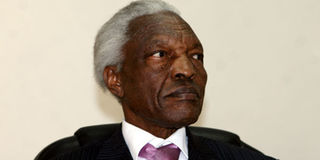Kenya Truth team wants Kiplagat out

The Truth, Justice and Reconciliation Commission chairman Bethuel Kiplagat during a press conference on April 13,2010 at Delta House, Nairobi. The Commissioners unanimously resolved that Mr Kiplagat steps aside to facilitate the formation of a tribunal to investigate allegations against him. Photo/WILLIAM OERI
The Truth, Justice and Reconciliation Commissioners have unanimously resolved that chairman Bethuel Kiplagat steps aside to facilitate the formation of a tribunal to investigate allegations against him.
The nine commissioners said on Tuesday that their decision was reached so as to insulate the TJRC against a credibility crisis.
They added that they had requested the Justice minister Mutula Kilonzo, in writing, to ask the Chief Justice to form a tribunal to investigate allegations levelled against Mr Kiplagat.
The truth team said " the allegations touch upon the following three areas of concern that are within our mandate: Illegal or irregular acquisition of land; The assassination of the Honourable Robert Ouko; and the Wagalla Massacre."
The commissioners, who were addressing a news conference at Delta House, Nairobi, said that Tecla Namachanja will serve as the commission's chairperson in an acting capacity.
However, Mr Kiplagat, who was present at the media briefing, maintained that he will only step aside if a tribunal is put in place and if the law requires him to do so.
“If the tribunal is agreed upon and established, I will follow the rule of law, if the law says I step aside, I will step aside,” he said.
The commissioners are: Tom Ojienda, Ahmed Sheikh Farah, Ms Namachanja and Berhanu Dinka.
Others are: Ms Betty Murungi, Ms Margaret Wambui Shava, Prof Ronald Slye of the US and Zambia’s Gertrude Chawatama.
The Truth, Justice and Reconciliation Act sets out the procedures for the removal of the TJRC chairman or commissioner. Under the Act, it is only the President who can remove the chair or a commissioner.
Reads section 17 (2) of the Act; “Where the question of the removal from office of the chairperson or a commissioner arises under subsection, the Chief Justice shall, by notice in the Gazette, appoint a Tribunal which shall consist of a chairperson and two other members selected by the Chief Justice from among persons who hold or have held office as judges of the High Court.”
The tribunal will then investigate the matter and report its findings to the CJ stating whether the commissioner under investigation ought to leave office or not.
The CJ will, in turn, forward the recommendations to the president for necessary action.
The law further provides that the President may suspend the chairperson or the commissioner from the Commission while he or she is under investigation by the tribunal.
Mr Kiplagat has consistently fended off accusations that he was involved in past injustices.
In February, ten former heads and members of previous truth and justice commissions across the world demanded his immediate resignation, citing reports linking him to past injustices.
Led by Nobel Peace Prize winner and former chairman of the South African Truth and Reconciliation Commission, Archbishop Desmond Tutu, the ten cited two local commissions of inquiry they said had raised serious questions on Mr Kiplagat's involvement in the injustices.
They referred to a report of the Commission of Inquiry into Illegal and Irregular Allocation of Public Land released in 2004 and that of the Parliamentary Select Committee of Inquiry into the murder of former Foreign Affairs minister Robert Ouko.
Further, they noted that the Ndung'u report had made references to Mr Kiplagat's acquisition of public land illegally while the parliamentary committee chaired by former Kisumu Town East MP Gor Sungu had concluded that he was untruthful.
Mr Kiplagat has also faced charges of complicity in the February 1984 Wagalla massacre. He has been accused of attending a security meeting that authorised a disarmament operation that led to the massacre of some Degodia people at Wagalla airstrip.
Hundreds of people were herded onto the airstrip where they were tortured, starved to death, or shot dead by the security forces.
A visitors' book at the Wajir DC's office where the meeting took place listed Mr Kiplagat as one of those in attendance.
But, Mr Kiplagat vigorously denied the claims, insisting that he never attended the meeting.
The TJRC boss has also been accused of failing to disclose the truth regarding the murder of Dr Robert Ouko when he appeared before the Commission of Inquiry into the death chaired by Justice Evan Gicheru.
The TJRC chair was Dr Ouko's Permanent Secretary when the minister met his death in February 1990.
He also denies claims by human rights activists and former political detainees that he was a strong defender of the Kanu regime that committed some of the injustices.




